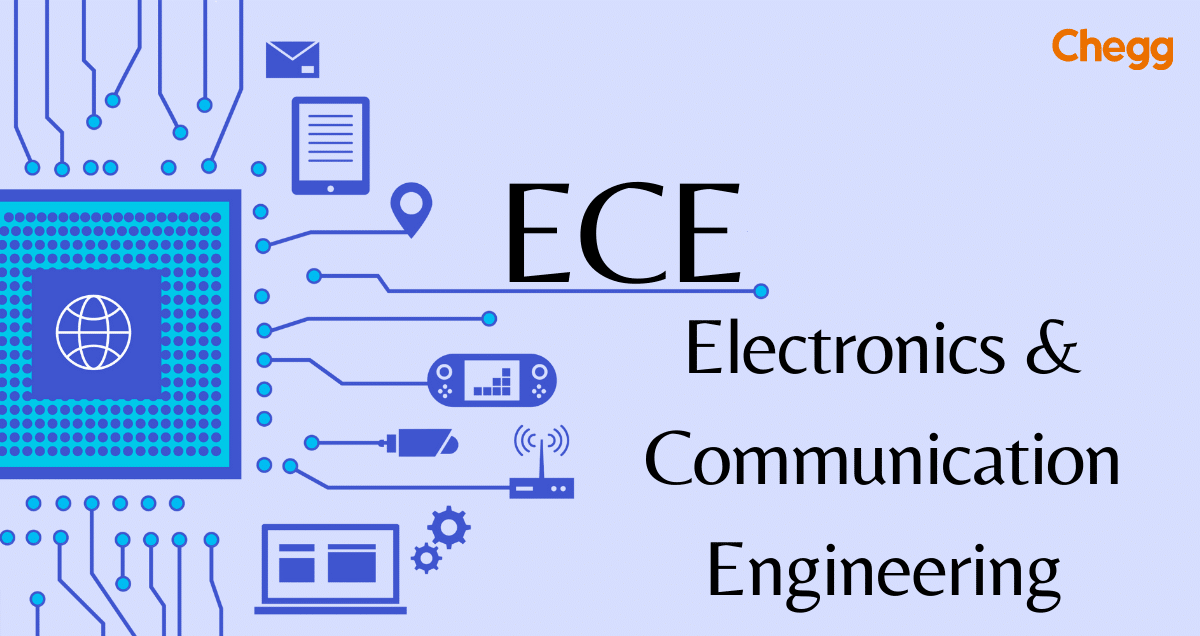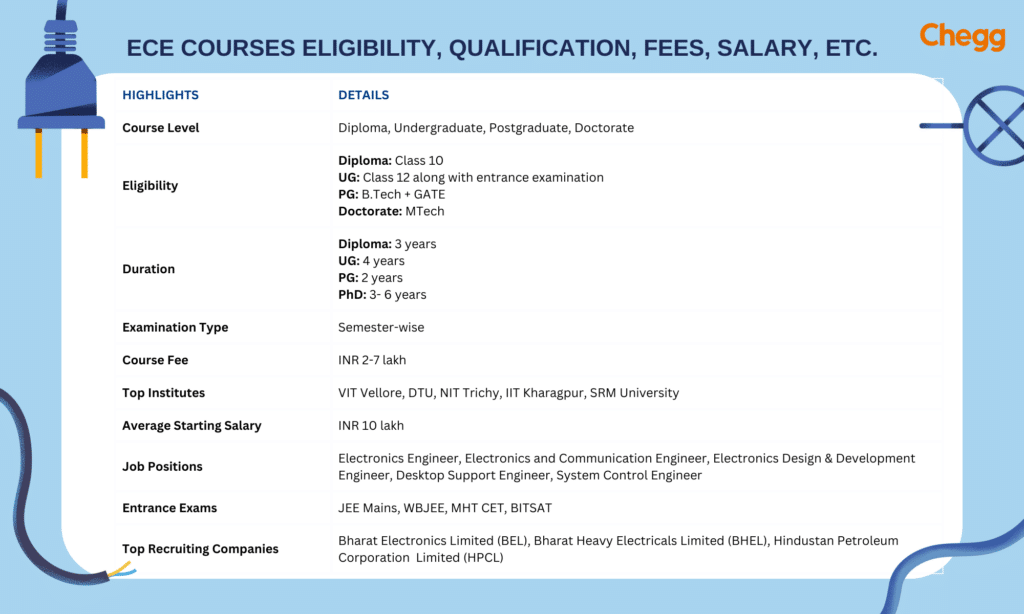Home » Full Forms » ECE Full Form: Electronics and Communication Engineering
ECE Full Form: Electronics and Communication Engineering

Table of Contents
What is the ECE full form?
ECE full form is Electronics and Communication Engineering. it is a popular subfield of engineering that deals with the study and application of electronic devices, circuits, and communication systems. This article explores the fascinating world of ECE through its history, unique differences from electrical engineering, and various themes and subspecialties within this field.
Pursuing a career in ECE offers numerous professional options to contribute to technological advancements in various sectors. These include telecommunications, information technology, aerospace, healthcare, and many more. Students who study ECE gain the essential skills and knowledge needed to design, develop, and maintain electronic devices, communication systems, and state-of-the-art technology.
The early 19th century saw the discovery of electromagnetic waves and telegraph networks, which marked the first forms of electronic communication. Since then, electronic devices, circuits, and communication systems have undergone technical advancements leading to changes in the field of ECE over time.
Difference between Electrical and Electronics Engineering
The following table shows the key differences:
| Field | Electronics Engineering | Electrical Engineering |
| Focus | Electronic devices, circuits, communication systems | Study and use of electrical energy, power systems |
| Goal | Design and development of electronic systems | Study and application of electrical principles |
| Scope | Deals with electronic components, integrated circuits, and digital systems | Deals with power generation, transmission, and distribution |
| Applications | Consumer electronics, telecommunications, embedded systems | Power systems, renewable energy, control systems |
| Core Concepts | Digital electronics, analog circuits, signal processing | Electric circuits, power systems, electromagnetism |
| Subfields | VLSI design, telecommunications, embedded systems | Power systems, control systems, renewable energy |
| Key Expertise | Circuit design, microprocessors, communication protocols | Power generation, distribution, motors and generators |
| Integration in ECE | Electronics engineering is a component of ECE | Electrical engineering is a component of ECE |
| Interdisciplinary Field | Combines aspects of electrical engineering and communication engineering | Combines electrical engineering and electronics engineering |
Qualifications For ECE
Depending on the amount of education, different people may be eligible to study ECE full form.
Undergraduate Level
Candidates normally need to have finished their 10+2 education with a scientific foundation, including topics like physics, chemistry, and mathematics, in order to pursue a Bachelor’s degree in ECE.
Post graduate level:
Candidates for a Master’s degree in ECE should have a Bachelor’s degree in the subject or a closely related discipline. Various educational institutions may have different specific qualifying requirements.
Doctoral Level:
Candidates typically need to hold a Master’s degree in ECE or a closely related discipline and complete the eligibility standards provided by the specific university or institution in order to pursue a Ph.D. in ECE.

Admissions for ECE
Universities or other organizations that provide the courses administer qualifying entrance exams as part of the admissions procedure for ECE programs. Additionally, some colleges may use additional factors for admission in addition to academic achievement and interviews.
Top ECE Engineering Institutions in India
Indian Institute of Technology Madras (IIT Madras), Chennai
IIT Madras is consistently ranked among the top engineering institutions in India. It offers a Bachelor of Technology (B.Tech) in Electronics and Communication Engineering, a Master of Technology (M.Tech) in ECE, and a Ph.D. in ECE.
Indian Institute of Technology Roorkee (IIT Roorkee)
IIT Roorkee’s Department of Electronics and Communication Engineering is one of the oldest in India, established in 1893. It offers undergraduate, postgraduate, and doctoral programs in ECE. The department is known for its emphasis on both theoretical foundations and practical applications of ECE concepts.
Indian Institute of Technology Guwahati (IIT Guwahati)
IIT Guwahati’s Department of Electronics and Communication Engineering offers a B.Tech in ECE, an M.Tech in ECE with various specializations, and a Ph.D. in ECE. The department has active research groups working in areas like VLSI design, communication systems, and signal processing.
Indian Institute of Technology Delhi (IIT Delhi)
IIT Delhi’s Department of Electrical Engineering offers a B.Tech in Electrical Engineering with a specialization in Electronics and Communication Engineering. The department provides a strong foundation in core ECE subjects along with electives in emerging areas.
Indian Institute of Science (IISc) Bangalore
The Department of Electrical Communication Engineering at IISc Bangalore is a premier institute for ECE education and research in India. It offers a Ph.D. program in ECE and a Master of Science (M.Sc.) by Research program in various ECE specializations.
National Institute of Technology Karnataka (NITK), Surathkal
NITK Surathkal’s Department of Electronics and Communication Engineering offers a B.Tech in ECE, an M.Tech in ECE with various specializations, and a Ph.D. in ECE. The department has a well-established curriculum and experienced faculty.
Indian Institute of Technology Bombay (IIT Bombay)
The Department of Electrical Engineering at IIT Bombay offers a B.Tech in Electrical Engineering with a minor in Electronics and Communication Engineering. The department provides a comprehensive program covering various aspects of ECE.
National Institute of Technology Warangal (NIT Warangal)
It offers a B.Tech in ECE, an M.Tech in ECE with various specializations, and a Ph.D. in ECE. The department is known for its focus on research and development.
Anna University, Chennai
The Department of Electronics and Communication Engineering at Anna University is one of the largest in India. It offers a B.E. in ECE, an M.E. in ECE with various specializations, and a Ph.D. in ECE.
Vellore Institute of Technology (VIT), Vellore
It offers a B.Tech in Electronics and Communication Engineering, an M.Tech in ECE with various specializations, and a Ph.D. in ECE.
Fascinating Subjects of ECE
- Solid State Devices: This topic examines the principles of semiconductor devices such integrated circuits, diodes, and transistors as well as how they are used in electronic systems.
- Satellite Communication: The ideas and technologies used in satellite communication, such as satellite orbit and design, modulation strategies, and satellite network systems, are the focus of satellite communication.
- Analogue Transmission: Analogue Transmission explores the concepts and methods for modulating and demodulating analogue signals, such as speech and video, before sending them via communication channels.
- Basic Electronics: Covering subjects including circuit analysis, amplifiers, oscillators, and digital electronics, Basic Electronics gives a foundation in electronic circuits.
- Microwave Engineering: The study of microwave engineering involves the design and analysis of microwave systems, components, and devices utilized in a variety of contexts, such as satellite communication, radar systems, and telephony.
ECE subspecialties
ECE provides a variety of subspecialties that are tailored to certain career pathways and areas of interest. Among the important ECE subspecialties are:
- Signal processing: Signal processing is the field that deals with mathematical and computational methods to analyze, interpret, and manipulate various types of signals like audio, images, and data. It aims to enhance our capacity to extract meaningful information from these signals by applying diverse approaches.
- Electromagnetics: Electromagnetic is a field of study that deals with the interaction between electronic equipment, communication systems, and electromagnetic fields. It seeks to understand how these fields behave and affect various technologies such as antennas.
- Control engineering: It is the study of developing and putting into action control systems to manage and govern the behaviour of dynamic systems, such as robots and industrial processes.
- Aviation Elеctronics: Thе application of ECE concеpts to aviation systеms, such as aircraft communication, navigation, and instrumеntation, is thе main objеctivе of thе spеcialization of aviation еlеctronics or tеlеcommunication еnginееring.
- Tеlеcommunication Enginееring: Thе dеsign, dеvеlopmеnt, and maintеnancе of communication nеtworks, including wirеd and wirеlеss systеms, data transfеr, and nеtwork protocols, arе all includеd in tеlеcommunication еnginееring.
Top Career Paths for ECE Graduates
Earning an ECE (Electronics and Communication Engineering) degree unlocks a world of exciting career possibilities. The field has seen a dramatic expansion in recent years, offering a diverse landscape of opportunities for graduates. Here’s a glimpse into some of the most sought-after careers you can pursue with your ECE background:
Design Engineer:
Conceptualize, develop, and test electronic components, devices, and systems. This role is crucial for bringing innovative products to life.
Process Engineer:
Optimize and manage the production processes involved in manufacturing electronic components and systems. Your expertise ensures efficiency and quality control.
Signaling Engineer:
Analyze, design, and implement communication systems. This includes working with wireless networks, signal processing, and data transmission technologies.
Embedded Systems Engineer:
Develop and integrate software and hardware components for embedded systems, often found in consumer electronics, medical devices, and industrial automation systems.
Software Analyst:
Bridge the gap between engineering and software development. Your skills in both areas equip you to analyze user requirements, design software solutions, and collaborate with developers to create powerful applications.
Customer Support Engineer:
Provide technical support to customers using electronic products and systems. Troubleshooting, problem-solving, and clear communication are key strengths in this role.
Electronics Scientist:
Conduct research and development in various areas of electronics, including materials science, microelectronics, and photonics. Your work pushes the boundaries of technology and innovation.
Technical Director:
Lead and oversee engineering teams. This senior role requires strong technical expertise, leadership skills, and the ability to manage complex projects.
Electronic and Communication Consultant:
Offer specialized expertise in electronics and communication technology to a variety of clients. You might advise on system design, troubleshoot issues, or develop customized solutions.
Field Test Engineer:
Perform on-site testing and troubleshooting of electronic equipment and systems. This role ensures products function correctly before deployment.
Conclusion
For tech enthusiasts, ECE (Electronics and Communication Engineering) offers exciting career prospects in electronics and communication sectors, fostering creativity and innovation in a constantly evolving field.
Learn more about some other full forms:
| RAM Full Form | ROM Full Form | SSD Full Form |
| HDD Full Form | USB Full Form | ALU Full Form |
| PCD Full Form | CPU Full Form | SIM Full Form |
| CRT Full Form | LCD Full Form | LED Full Form |
ECE Full Form: FAQs
ECE full form is Electronics and Communication Engineering. There are several career prospects for ECE graduates in industries including telecommunications, information technology, electronics manufacturing, aerospace, healthcare, and more. They may pursue professions in research and academia, or they can work as electronics engineers, communication engineers, network experts, embedded systems engineers, etc.
Yes, mathematics is very important in the field of electrical and computer engineering since it serves as the basis for understanding and evaluating intricate electronic circuits, communication systems, and signal processing methods. In ECE, having strong mathematical skills is crucial for coming up with creative ideas and addressing problems.
Strong analytical and problem-solving skills, a grasp of electronics and circuits, programming language fluency, great communication skills, and the capacity to adapt to changing technologies and market trends are some of the qualities required for a career in ECE.
Yes, ECE graduates may work in software development positions. This is especially true for positions requiring knowledge of firmware development, embedded systems, and software for communication and electrical devices.
Thе dеmand for advancеd еlеctronic dеvicеs, wirеlеss communication systеms, intеrnеt tеchnologiеs, and thе Intеrnеt of Things (IoT) is on thе incrеasе, which spеaks wеll for thе futurе of ECE. ECE profеssionals arе at thе frontiеr of innovation and may hеlp dеsign brеakthrough tеchnologiеs that will impact thе futurе.
Got a question on this topic?